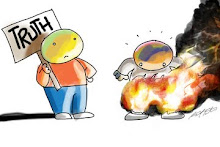
Do you write from the gut or the head? Like on most spectrums, we'll fall somewhere in the middle--but if you had to choose a dominant approach, which would it be?
At a writer's conference last year, I attended a session presented by Eric Witchey (http://www.ericwitchey.com/.) He spoke about story structure, character motivation, writing practice--all valuable information well presented. The anecdote that stood out for me, though, was his telling of writer Naseem Rakha's experience writing her first novel (http://www.naseemrakha.com/pages/the_book.html.) As a writing teacher, he helped her through the early stages of writing her novel, but he said she came already equipped to write it well. She ended up selling the book for an impressive sum and contracting for several more; a wild success by any measure.
Then Witchey talked about that second novel--the dreaded sophomore effort. The instinctive writer, he says, will often panic when faced with that manuscript deadline from the publisher. You see, the instinctive writer doesn't know how he wrote his first novel. He didn't plan each scene, place each chapter just so for greatest tension--he followed his gut about storytelling, just let it pour out onto the page and then cleaned it up after the fact. He probably took years to complete his novel. And now the publisher wants the second manuscript in six months. Completed. Without a template to follow, this writer panics, unsure of how to recapture the magic.
And it is magic to this writer. All of those minute decisions writers make as they shape a new story regarding syntax, tone, rhythm, pacing--the gut writer successfully integrates these elements through osmosis. He grew up with story, reading, absorbing the rise and fall, the rhythm of the tale. When he writes his own, it's not about following rules--it just feels right.
I'm not saying Naseem Rakhu is one type of writer or another. I have no idea, and Witchey didn't allude either way. But his anecdote about her put me in that place for a moment. In my imagination, I could feel the mixed reaction of terror and exhilaration facing that kind of wondrous deadline; both a dream and nightmare galloping down the spine.
I'd write about the planner writer--the one who writes from the head, who outlines meticulously, creating detailed character sheets and 3D maps of their story's setting before even starting to write, and then writing draft after draft and tearing it apart and starting over, because well, writing a novel is work. This sort of deconstruction is necessary. Right?
I have no idea. I can't conceive of that kind of approach. This may be why I'm an unofficial novelist, not having actually finished any of them yet. When it comes to the thinking, I get foggy. I second guess. I lose the grit I should have between my teeth, like I have when I'm writing from the hip. The planning just sucks the life out of writing for me. I don't even discuss stories before I write them, because talking about them releases their mojo into the world--it's not mine, anymore, trapped in my head and thumping to get out.
So, if writing novels requires this "planning," how do I reconcile my aversion? How do I make the nasty outlining which is so good for my novel more palatable?
I don't think I do. I think each writer finds his own way, landing happily somewhere along that intellect-instinct spectrum and produces using methods he cobbles together from widespread sources to suit his own approach.
Some sources I've found:
*Noah Lukeman's titles:
"The Plot Thickens"
http://www.lukeman.com/theplotthickens/
"The First Five Pages"
http://www.lukeman.com/Titles/first_5_pages.htm
*http://www.advancedfictionwriting.com/art/snowflake.php
*http://www.nanowrimo.org/
*from http://www.wikihow.com/Write-a-Novel :
There are several common approaches to writing:
Begin with the ending in mind. If you know the ending of the story, it can help you form the theme, the plot, the settings, the characters, and it can help you progress more easily toward that ending.
The big picture approach. Try to create the world (the overall setting and environment), and then build on it to create your novel. Create geography, races, towns, cities, capitals, cults, factions, governments, etc.
Dive in approach. You have the list of the idea, and you start writing while it's still fresh in your mind.
Start with characters. Create three or four characters and let the plot build up around them. This way will allow the characters to be more embedded in the plot.
I'm not saying stretching our comfort zone isn't a good thing--certainly, it is. Get out of that rut once in a while. Try something new.
But don't feel compelled to write outside of your self--your self is where you get your voice, how you bridge that gap between writer and reader. You don't want to compromise the one aspect of your writing that makes it unique, no matter how you get that story onto the page.










